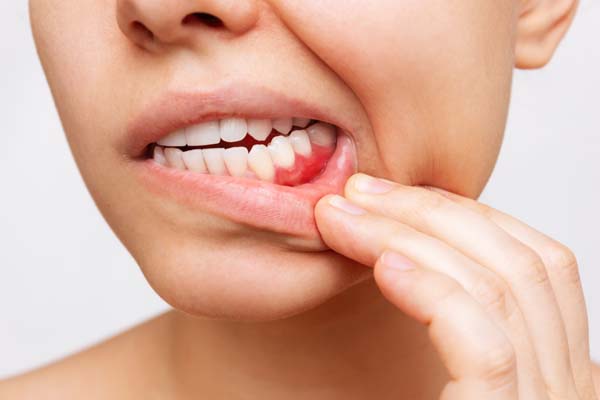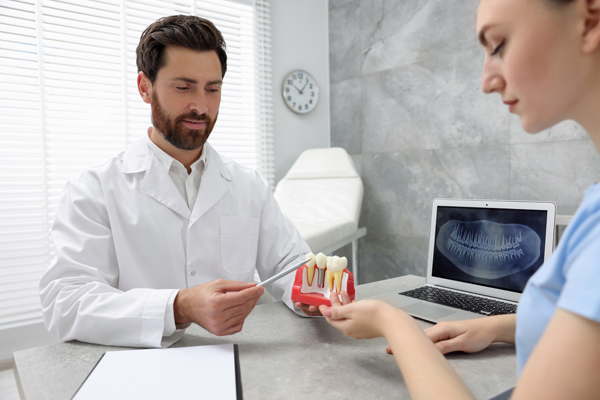Can Gum Disease Be Prevented?

According to the Centers for Disease Control and Prevention, almost half of the United States population has some form of gum disease by the time they reach the age of 30. The risk increases by age 65, with over 70% of Americans experiencing this issue later in life. While gum disease is very treatable, it cannot always be prevented, depending on the underlying cause. However, there are ways to successfully lower your risks for this condition and enjoy better oral health.
Understanding the cause of gum disease
Gum disease is the result of chronic inflammation of the soft tissues of the mouth. In its early stages, it presents itself as swelling, tenderness, and minor bleeding. However, if left untreated, it will usually progress and lead to the pulling away of the gums from the teeth. This often causes sensitivity and pain, as well as infections, decay, loose teeth, and eventual tooth loss.
The leading cause of gum inflammation is the buildup of plaque and bacteria from food particles. Over time, this buildup hardens into tartar, which can only be removed by a dental professional. In more severe cases, the tartar can develop below the gum line, resulting in serious periodontal issues.
Most of the time, bacterial and tartar buildup are caused by a lack of proper brushing, flossing, and professional cleaning. This eventually leads to gum disease. However, some underlying medical or genetic conditions can increase the risks, including:
- Pregnancy
- Diabetes
- Autoimmune conditions
- Hormonal changes
- Dry mouth
Those who have a higher risk for developing periodontal issues should take steps to prioritize their oral health and prevent complications.
Lowering your risks for gum disease
While there are no guarantees for completely preventing gum disease, you can significantly lower your risks and reduce the severity of symptoms by developing healthy habits. Small changes and simple positive practices can make a big difference.
Maintain good dental hygiene
Daily brushing is imperative for healthy teeth and gums, but flossing is especially important. Flossing limits tartar buildup between teeth and improves periodontal health. Using a mouth rinse to kill harmful bacteria can also help keep gum tissues healthy and strong.
See a dentist on a regular basis
While daily dental hygiene is critical, it is not enough to remove tartar altogether. Seeing a dentist at least twice a year ensures that this is removed to help prevent decay and the development of gum disease. Patients who have been diagnosed with periodontal issues may need to see a dentist more often for cleanings.
Focus on your overall health
Some conditions that increase the risks for gum disease, such as high stress and type-2 diabetes, are often preventable. Prioritize good health to avoid these unnecessary risks. Limit alcohol consumption and do not smoke or use tobacco since these can also increase your chances of developing gum disease.
Conclusion
Gum disease is a serious and widespread dental issue. It can lead to serious complications over time, including tooth loss. Fortunately, you can lower your risks and diminish symptoms with proper care and good habits.
Request an appointment here: https://www.agawamdentalarts.com or call Agawam Dental Arts at 4133627815 for an appointment in our Feeding Hills office.
Check out what others are saying about our services on Yelp: Read our Yelp reviews.
Recent Posts
Gum disease treatment addresses the root source of the disease and halts the ramifications. Gum disease, or periodontal disease, is a common condition that damages the gums and the structures that support the teeth. If left untreated, it can cause serious problems, including tooth loss. The good news is that if caught early, these treatments…
Tooth implants are replacements that look, feel and function like natural teeth. They can be used when someone loses their teeth to injury or decay. The tooth implant procedure is simple, but patients often have plenty of questions about it. Continue reading to discover answers to some frequently asked questions about tooth implants.Accidents, unsuccessful root…
While getting a tooth extraction may seem daunting, there are many situations where the procedure offers significant health benefits. General dentists often only recommend removing a tooth when keeping it will do more harm than good. Tooth extraction may be necessary to improve overall oral health, alleviate discomfort, and prevent further complications. Here are five…
Considering clear braces? Read on to learn more about the process and duration of treatment. Patients often inquire about the length of time they will need to wear clear braces at their first appointment with the dentist. The patient's condition mostly determines the duration. Braces may take longer than expected in certain cases, and individuals…


